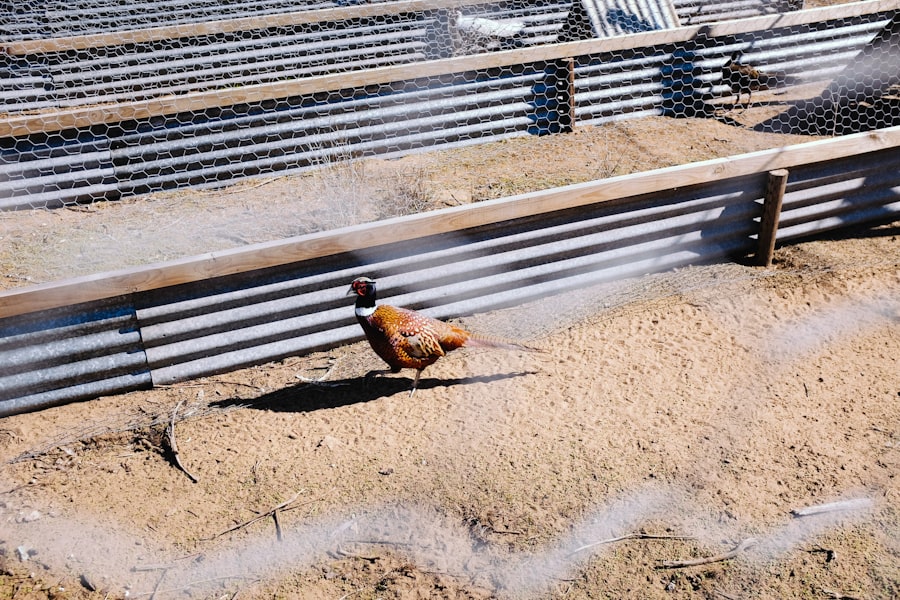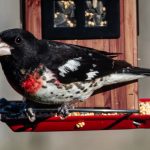Chickens are naturally curious and social animals with a strong foraging instinct. They exhibit territorial behavior and protect their nesting areas. Understanding these traits is essential for effective management and deterrence.
Chickens are easily startled, which can result in erratic behavior like flying or running away, making it challenging to contain them within designated areas. Their persistence and determination, especially when seeking food, can make deterrence difficult. However, chickens are also highly trainable and can learn to associate specific areas with negative experiences, such as loud noises or unpleasant scents.
By comprehending their natural behaviors, it becomes easier to develop effective deterrence strategies. Approaching chicken deterrence requires patience and understanding, as their behavior is instinct-driven and can be challenging to modify without the appropriate methods.
Table of Contents
- 1 Creating Physical Barriers
- 2 Using Natural Deterrents
- 3 Training and Redirecting Chickens
- 4 Providing Alternative Sources of Food and Entertainment
- 5 Regular Maintenance and Monitoring
- 6 Seeking Professional Help if Necessary
- 7 FAQs
- 7.1 What are some natural ways to keep chickens off plants?
- 7.2 How can I train my chickens to stay away from my plants?
- 7.3 Are there any commercial products available to keep chickens off plants?
- 7.4 What are some plants that chickens are less likely to eat?
- 7.5 Why is it important to keep chickens off plants?
Key Takeaways
- Chickens are naturally curious and will explore their surroundings, so understanding their behavior is key to effectively managing them.
- Creating physical barriers such as fences and netting can help keep chickens out of unwanted areas.
- Using natural deterrents like predator decoys and strong-smelling plants can discourage chickens from entering certain areas.
- Training and redirecting chickens using positive reinforcement can help steer them away from problem areas.
- Providing alternative sources of food and entertainment, such as designated foraging areas and toys, can keep chickens occupied and less likely to cause trouble.
- Regular maintenance and monitoring of barriers and deterrents is essential to ensure their effectiveness.
- Seeking professional help, such as from a poultry behavior specialist, may be necessary for persistent chicken behavior issues.
Creating Physical Barriers
Securing the Barriers
It is crucial to ensure that the barriers are secure and tall enough to prevent chickens from flying over or squeezing through. Regular inspections and maintenance are also necessary to ensure the barriers remain effective over time.
Alternative Barrier Options
Another option is to use chicken wire or mesh to cover specific areas, such as flower beds or vegetable patches. This allows air and sunlight to reach the plants while preventing chickens from scratching and foraging.
Additional Considerations
When using physical barriers, it’s essential to secure the wire or mesh firmly in place to prevent chickens from lifting or moving it. Additionally, consider the potential for other wildlife, such as rodents or insects, to be attracted to the protected area and take measures to prevent their access as well.
Using Natural Deterrents
In addition to physical barriers, natural deterrents can also be effective in deterring chickens from certain areas. One common natural deterrent is the use of strong scents, such as citrus or vinegar, which chickens find unpleasant. Spraying these scents around the perimeter of sensitive areas can help discourage chickens from entering those spaces.
It is important to reapply these scents regularly, especially after rain or watering, as they can dissipate over time. Another natural deterrent is the use of predator decoys, such as fake owls or snakes, which can create the illusion of danger and discourage chickens from approaching certain areas. It is important to regularly move these decoys around to prevent chickens from becoming accustomed to their presence.
Additionally, it is important to ensure that the decoys are realistic and well-maintained, as chickens may become wary if they appear fake or ineffective.
Training and Redirecting Chickens
Training and redirecting chickens can also be an effective way to deter them from unwanted areas. One method of training chickens is through the use of positive reinforcement, such as providing treats or rewards when they stay away from sensitive areas. This can help them associate those spaces with positive experiences and encourage them to stay away in the future.
It is important to be consistent with this training and provide regular rewards to reinforce the desired behavior. Another method of redirecting chickens is by providing alternative sources of food and entertainment in designated areas. This can help keep chickens occupied and satisfied, reducing their desire to forage in sensitive areas.
Providing scratching posts or dust baths can also help redirect their natural behaviors in a more appropriate setting. It is important to regularly monitor and maintain these alternative sources to ensure that they remain effective in deterring chickens from unwanted areas.
Providing Alternative Sources of Food and Entertainment
In addition to training and redirecting chickens, providing alternative sources of food and entertainment can help deter them from unwanted areas. One option is to create designated feeding areas for chickens, where they can access food without needing to forage in sensitive spaces. This can help reduce their motivation to access those areas and keep them occupied in a more appropriate setting.
It is important to regularly replenish these feeding areas with fresh food and ensure that they remain accessible and appealing to the chickens. Another option is to provide entertainment for chickens in the form of toys or activities that keep them engaged and occupied. This can include hanging treats or vegetables for them to peck at, or providing objects for them to explore and interact with.
Keeping chickens mentally stimulated can help reduce their desire to forage in sensitive areas and redirect their energy in a more productive way. It is important to regularly rotate and introduce new forms of entertainment to prevent chickens from becoming bored or disinterested.
Regular Maintenance and Monitoring

Inspecting Barriers and Deterrents
Regular inspections of physical barriers and natural deterrents are crucial to ensure they remain effective in deterring chickens. This involves monitoring the behavior of the chickens and adjusting strategies as needed based on their responses.
Staying One Step Ahead
Chickens can become accustomed to certain deterrents, making it necessary to introduce new methods or make adjustments to existing ones. This proactive approach helps stay one step ahead of the chickens and prevents them from becoming a problem.
Maintaining Sensitive Areas
Regular maintenance and monitoring also involve keeping sensitive areas well-maintained and free of potential attractants for chickens. This includes promptly cleaning up spilled food or removing fallen fruit from trees to reduce the appeal of those spaces to chickens.
Seeking Professional Help if Necessary
In some cases, deterring chickens from unwanted areas may require professional assistance. This can include consulting with a poultry expert or animal behaviorist who can provide guidance on effective strategies for managing chicken behavior. Professional help may also be necessary if there are legal restrictions or regulations regarding the management of chickens in a specific area.
Additionally, seeking professional help may be necessary if other wildlife or pests are attracted to sensitive areas along with the chickens. A professional pest control service can provide guidance on managing these additional challenges while deterring chickens effectively. In conclusion, deterring chickens from unwanted areas requires a combination of understanding their behavior, creating physical barriers, using natural deterrents, training and redirecting them, providing alternative sources of food and entertainment, regular maintenance and monitoring, and seeking professional help if necessary.
By approaching the task with patience and consistency, it is possible to effectively manage chicken behavior and prevent them from accessing sensitive spaces.
If you’re looking for more information on keeping chickens in your garden, you might be interested in learning about how to insulate a chicken coop. This article from Poultry Wizard provides helpful tips on keeping your chickens warm and comfortable during the colder months. Check it out here.
FAQs
What are some natural ways to keep chickens off plants?
Some natural ways to keep chickens off plants include using physical barriers such as fences or netting, planting deterrent plants like marigolds or lavender, and using natural repellents like citrus peels or vinegar.
How can I train my chickens to stay away from my plants?
You can train your chickens to stay away from your plants by using positive reinforcement, such as providing them with alternative areas to forage and rewarding them when they stay away from the plants. You can also use negative reinforcement, such as making loud noises or using a water sprayer when they approach the plants.
Are there any commercial products available to keep chickens off plants?
Yes, there are commercial products available such as chicken wire cloches, motion-activated sprinklers, and chicken repellent sprays that can help keep chickens away from plants.
What are some plants that chickens are less likely to eat?
Chickens are less likely to eat plants that have strong scents or tastes, such as herbs like rosemary, thyme, and sage. They also tend to avoid plants with prickly or spiky leaves, such as holly or barberry.
Why is it important to keep chickens off plants?
It is important to keep chickens off plants because they can damage or destroy the plants by scratching, pecking, or eating them. Additionally, some plants may be toxic to chickens, so it is important to prevent them from accessing these plants.
Meet Walter, the feathered-friend fanatic of Florida! Nestled in the sunshine state, Walter struts through life with his feathered companions, clucking his way to happiness. With a coop that’s fancier than a five-star hotel, he’s the Don Juan of the chicken world. When he’s not teaching his hens to do the cha-cha, you’ll find him in a heated debate with his prized rooster, Sir Clucks-a-Lot. Walter’s poultry passion is no yolk; he’s the sunny-side-up guy you never knew you needed in your flock of friends!







